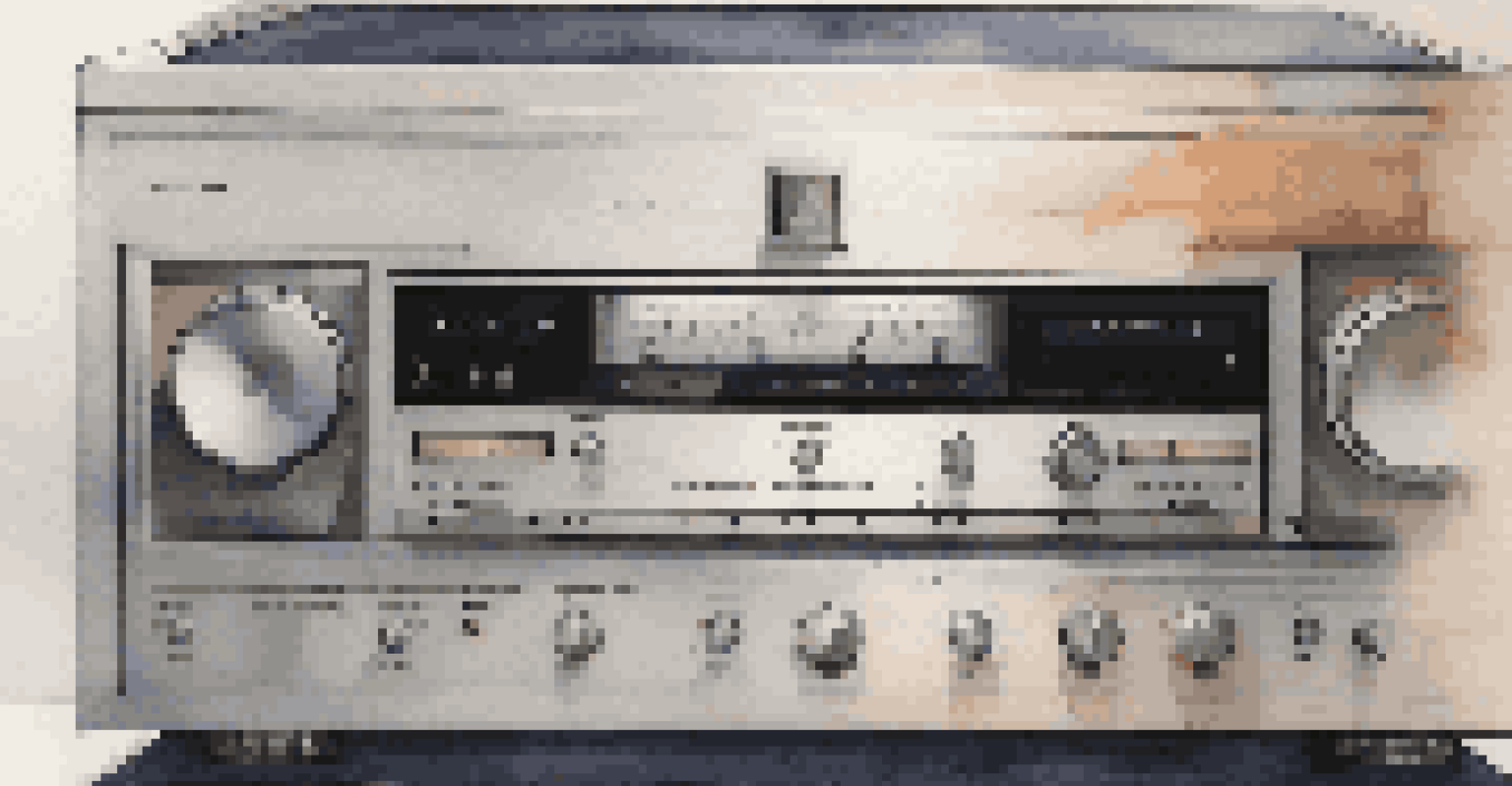The Influence of Audio Quality on Music Consumption Choices

Understanding Audio Quality: Why It Matters
Audio quality refers to how well sound is reproduced, encompassing clarity, balance, and detail. Think of it like the difference between watching a movie in standard definition versus high definition; the latter provides a more immersive experience. Similarly, high-quality audio can enhance the emotional impact of a song, making it feel more vivid and engaging. As music consumers, we often gravitate towards better audio experiences, whether through streaming services or physical formats.
The quality of your audio is the quality of your experience.
In recent years, streaming platforms have introduced high-fidelity options, allowing listeners to enjoy music in higher quality. This shift reflects a growing demand for better sound, as audiophiles and casual listeners alike seek richer listening experiences. For example, services like Tidal and Amazon Music HD offer lossless audio formats, which capture more detail than typical compressed files. By prioritizing audio quality, these platforms cater to an audience that values sound as much as the music itself.
Ultimately, audio quality can significantly influence our music consumption choices. When given the option, many listeners prefer higher quality sound, which can lead to increased satisfaction and deeper connections with the music. As technology advances and access to high-quality audio becomes more commonplace, the way we choose and enjoy music will continue to evolve.
The Rise of Streaming and Its Impact on Audio Quality
Streaming has revolutionized how we consume music, offering convenience and instant access to vast libraries. However, the trade-off often comes down to audio quality. Most streaming platforms use compression to reduce file sizes, which can impact the sound quality listeners experience. For many, this means sacrificing depth and detail for the sake of accessibility and speed.

In response to the demand for better sound, some streaming services are now offering higher-quality options. For example, Spotify recently announced plans to introduce a lossless audio tier, catering to users who prioritize sound quality. This move signifies a shift in the industry, recognizing that a segment of listeners is willing to pay more for a superior audio experience. As a result, consumers are becoming more conscious of audio quality when selecting their preferred platforms.
Audio Quality Enhances Experience
High-quality audio significantly elevates the emotional impact of music, making it feel more vivid and engaging.
As we navigate the streaming landscape, it's essential for listeners to be aware of the audio quality options available to them. Selecting a service that prioritizes high-fidelity sound can significantly enhance the overall music experience. Ultimately, the choices we make about streaming services can directly influence our enjoyment and connection to the music we love.
How Audio Equipment Affects Music Experience
The equipment we use to listen to music plays a crucial role in our overall experience. Whether it's earbuds, headphones, or speakers, the quality of these devices can dramatically alter how we perceive sound. For instance, a high-end pair of headphones can reveal nuances in a track that standard earbuds might overlook. Investing in quality audio equipment can elevate your listening experience and make you appreciate music on a deeper level.
Music is the universal language of mankind, and its quality speaks volumes.
Moreover, the environment where we listen also affects audio quality. A well-treated room can enhance sound clarity, while noisy or cluttered surroundings can muddle the experience. This is why audiophiles often dedicate spaces in their homes to optimize sound. By creating an ideal listening environment, we can fully immerse ourselves in the music and enjoy every detail.
Ultimately, choosing the right audio equipment is an essential part of music consumption. It allows listeners to experience their favorite songs as the artists intended. As technology improves and new products enter the market, consumers have more options than ever to enhance their music experience.
The Role of Music Genres in Audio Quality Preferences
Different music genres often come with varying expectations regarding audio quality. For instance, classical music typically benefits from high fidelity due to its intricate compositions and dynamic range. On the other hand, genres like electronic or hip-hop may prioritize bass and rhythm over subtle details. As a result, listeners may choose different audio settings or equipment based on the genre they are enjoying.
Moreover, genres with rich instrumentation, such as jazz or orchestral music, can significantly highlight the differences in audio quality. A high-resolution recording can allow listeners to hear individual instruments and their interactions, creating a more immersive experience. This appreciation for quality can lead fans to seek out better audio options, whether through premium streaming services or high-end equipment.
Streaming Services Shift Focus
With the rise of streaming, platforms are increasingly offering high-fidelity options to meet the growing demand for better sound.
In essence, our genre preferences can shape our expectations for audio quality, influencing our listening habits. As we explore diverse music styles, understanding how audio quality interacts with each genre can enhance our overall enjoyment. Emphasizing quality in our listening experience allows us to connect with the music on a more profound level.
The Impact of Social Media on Music Consumption Choices
Social media has become a powerful tool for discovering new music and connecting with artists. Platforms like Instagram and TikTok often spotlight songs through viral trends, influencing listeners' choices. However, the audio quality of these clips can vary significantly, impacting how we perceive the music. A catchy song may become popular for its hook, but the quality of the audio can affect whether we choose to explore it further.
Additionally, social media allows fans to share their preferences and recommendations, creating a community around music discovery. When users post about a song's quality, it can lead to increased interest and consumption. For example, if a user highlights the rich audio quality of a new album, it may encourage their followers to listen, especially if they value high-fidelity sound. This social influence can play a significant role in shaping our music choices.
As we engage with music on social media, it's essential to remember that audio quality matters. Despite the convenience of discovering new tracks online, we must also consider how sound quality affects our overall enjoyment. By prioritizing audio quality in our consumption choices, we can enhance our listening experiences and support artists who prioritize high-quality production.
The Psychology of Sound: How Quality Affects Emotion
Sound has a profound psychological impact on our emotions and memories. Various studies suggest that higher audio quality can enhance emotional responses to music, leading to a more profound connection with the songs we love. For instance, when listeners experience a song with rich, detailed sound, they may find themselves more immersed in the music, evoking stronger feelings. This emotional connection can influence our music consumption choices, as we seek out experiences that resonate with us.
Moreover, audio quality can affect how we relate to specific genres or artists. A well-produced track can elevate an artist’s message, making it more impactful and memorable. In contrast, lower-quality audio may diminish the emotional weight of a song, leading listeners to overlook its significance. As we explore different music styles, the audio quality can shape our perceptions and attachments to the music.
Equipment Influences Sound Perception
The quality of audio equipment directly affects how listeners perceive music, highlighting the importance of investing in good devices.
In conclusion, the psychology of sound highlights the importance of audio quality in our music consumption. It influences not only our emotional responses but also our preferences and choices as listeners. By seeking out high-quality audio experiences, we can cultivate a deeper connection to the music that moves us.
Future Trends: The Evolution of Audio Quality in Music
As technology continues to advance, the landscape of music consumption is evolving rapidly. Innovations such as spatial audio and immersive sound technologies are changing how we experience music. These developments promise to create more engaging and realistic listening experiences, allowing listeners to feel as though they are part of the music. Such advancements may further heighten the importance of audio quality in our consumption choices.
Additionally, the rise of high-resolution audio formats is gaining traction among audiophiles and casual listeners alike. With increasing access to high-fidelity options, more people are beginning to prioritize sound quality in their music choices. This shift may lead to a greater demand for quality production from artists and labels, ultimately resulting in a more enriching listening experience for everyone.

Looking ahead, the future of music consumption will likely be shaped by our collective desire for better audio quality. As listeners become more discerning, we may see a shift in industry standards, with a focus on delivering superior sound. By embracing these trends, we can enhance our music experiences and continue to connect with the art form in meaningful ways.